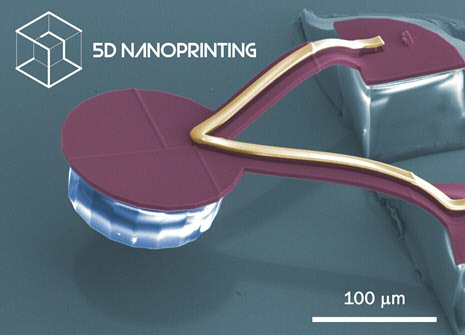Dr. Bose, Dr. Raffa and Prof. Picchioni partners in EU’s Horizon 2020 FET Open Program consortium
Dr. Ranjita K. Bose , Dr. Patrizio Raffa and Prof. Francesco Picchioni of the Engineering and Technology Institute Groningen ( ENTEG ) are partners in a consortium that received a European research council FET-Open 2018-2020 grant. The consortium’s ‘ 5DNanoPrinting ’ project has been awarded a grant of EUR 3.58 million, of which the UG’s allocation is EUR 547,000. The goal of the project is to develop innovative smart materials and novel fabrication methods for micro and nano devices. The Italian Institute of Technology is coordinator.
The project titled ‘Functional & Dynamic 3D Nano-MicroDevices by Direct Multi-Photon Lithography’ aims to develop fast and inexpensive functional 3D Nano- MicroDevices (NEMS/MEMS). MEMS, Micro ElectroMechanical Systems, are microscopic devices with moving parts which are capable of accomplish a specific task. They find applications in many fields such as consumer electronics, automotive and healthcare. The approach aspires to become a novel gold standard for micro/nano-technologies, similar to how 3D printing has become a cornerstone of manufacturing technologies in the last decade.
Novel polymers
The UG team of researchers will develop novel polymers, which will be used to make gradient structures with varying mechanical properties and crosslinking. The project’s consortium includes academic and industrial partners from Italy, Austria, Ireland and the Netherlands. The partners will bring expertise in chemistry, material science, physics and engineering.
FET Open
FET Open supports the early-stages of science and technology research and innovation around new ideas towards radically new future technologies.

| Last modified: | 13 October 2020 1.10 p.m. |
More news
-
03 April 2025
IMChip and MimeCure in top 10 of the national Academic Startup Competition
Prof. Tamalika Banerjee’s startup IMChip and Prof. Erik Frijlink and Dr. Luke van der Koog’s startup MimeCure have made it into the top 10 of the national Academic Startup Competition.
-
01 April 2025
NSC’s electoral reform plan may have unwanted consequences
The new voting system, proposed by minister Uitermark, could jeopardize the fundamental principle of proportional representation, says Davide Grossi, Professor of Collective Decision Making and Computation at the University of Groningen
-
01 April 2025
'Diversity leads to better science'
In addition to her biological research on ageing, Hannah Dugdale also studies disparities relating to diversity in science. Thanks to the latter, she is one of the two 2024 laureates of the Athena Award, an NWO prize for successful and inspiring...
